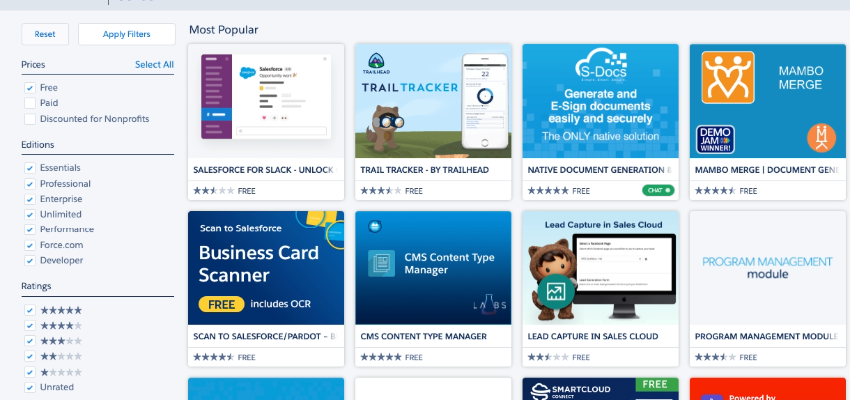Choosing the wrong CRM can cripple efficiency, increase costs, and frustrate your team. Enterprises typically face two options:
- Salesforce – A powerful, off-the-shelf CRM with extensive features and integrations.
- Custom-built CRM – A tailored solution designed for your company’s specific workflows.
This guide breaks down the key differences to help you decide which option best fits your business.
Understanding the Core Differences Between Salesforce and a Custom CRM
Choosing between Salesforce and a custom CRM depends on factors like flexibility, cost, and scalability. Enterprises need a CRM that aligns with their operations without unnecessary complexity or excessive costs. Here’s how the two options compare:
Salesforce CRM: A Scalable, Pre-Built Solution
Salesforce is a cloud-based CRM trusted by over 150,000 businesses, including Fortune 500 companies. It offers a robust, ready-made platform with essential features such as automation, reporting, and third-party integrations. Its scalability makes it ideal for growing teams and complex workflows. However, while Salesforce includes a vast set of standard tools, businesses often need to customize it to fit their unique processes. Pricing varies based on features, starting at $25 per user per month for Essentials and exceeding $300 per user per month for advanced plans like Enterprise and Unlimited.
Custom CRM: Tailored but Resource-Intensive
A custom CRM is built from the ground up to match a company’s exact needs. It offers full control over features, data structures, and user interfaces. Unlike Salesforce, a custom CRM comes with high upfront development costs—ranging from $50,000 to over $500,000—depending on complexity. Implementation can take anywhere from six months to two years, requiring dedicated development resources. While there are no recurring per-user fees, ongoing maintenance, security updates, and infrastructure costs must be considered.
Salesforce is the best option for companies looking for a scalable, feature-rich CRM with minimal development effort. It’s ideal for organizations that want to deploy quickly and integrate with existing tools. On the other hand, businesses with highly specific workflows, strict data requirements, or unique industry needs may find a custom CRM more beneficial despite the higher initial investment. The decision ultimately depends on budget, operational complexity, and long-term business goals.
2. Cost Comparison
When evaluating Salesforce versus a custom CRM, understanding the associated costs is crucial. Both options involve distinct expenses that can significantly impact your budget and long-term financial planning.
Salesforce CRM
Salesforce operates on a subscription-based pricing model, with costs varying based on the selected edition and additional features. Here’s a breakdown:
- Licensing Fees: Salesforce offers multiple editions:
- Essentials: Priced at $25 per user per month, suitable for small businesses.
- Professional: At $75 per user per month, it provides more advanced features for growing companies.
- Enterprise: Available for $150 per user per month, this edition offers a comprehensive set of tools ideal for medium to large businesses.
- Unlimited: The most extensive package at $300 per user per month, including premium support and unlimited capabilities.
Salesforce
- These fees are billed annually, translating to $300 to $3,600 per user per year.
- Implementation Costs: Deploying Salesforce isn’t just about licensing; implementation involves additional expenses. Depending on the complexity, costs can range from $10,000 for basic setups to over $200,000 for extensive customizations and integrations.
Ascendix - Additional Expenses: Beyond licensing and implementation, consider costs for add-ons, third-party integrations, and potential increases in subscription fees as your user base grows.
Custom CRM
Developing a custom CRM entails a different cost structure, primarily influenced by the project’s scope and complexity:
- Development Costs: Creating a custom CRM from scratch requires a significant investment. For small businesses, development might cost around $18,000. More advanced systems can range between $40,000 and $70,000, depending on the features and integrations required.
Aalpha - Ongoing Maintenance: Post-deployment, a custom CRM demands continuous maintenance to address bugs, implement updates, and adapt to evolving business needs. This requires allocating resources for an internal IT team or outsourcing to a service provider, adding to the overall expenditure.
- Internal IT Resources: Building and maintaining a custom CRM necessitates a skilled IT team. Salaries, training, and potential recruitment costs should be factored into the budget. Additionally, the time spent by your team on development and maintenance could impact productivity in other areas.
In summary, while Salesforce offers a predictable subscription model with potentially high implementation costs, a custom CRM requires a substantial upfront investment with ongoing maintenance expenses. Your decision should align with your company’s financial capacity, specific needs, and long-term strategic goals.
3. Implementation Time & Complexity
Salesforce has a clear advantage when it comes to deployment speed. Since it’s a pre-built platform, businesses can get started quickly with guided onboarding, extensive documentation, and certified consultants. A basic implementation can be completed in as little as 6 to 8 weeks, while more complex setups requiring custom workflows or integrations may take 3 to 12 months. The structured onboarding process reduces friction, making it easier for teams to adopt.
Custom CRM development, on the other hand, is significantly more complex. The process involves requirement gathering, software development, testing, and deployment. Even a minimum viable product (MVP) can take 6 to 9 months to build, while a fully featured CRM may require 12 to 24 months before it’s operational. The complexity also extends to user training, as teams must adapt to a system built specifically for the company, often without the level of structured support found in platforms like Salesforce.
If time-to-market is a priority, Salesforce is the better option. If your company can afford a longer development cycle in exchange for complete customization, a custom CRM could be the right fit.
4. Scalability & Flexibility

Salesforce is designed to scale with businesses of all sizes. With built-in automation, analytics, and integrations, companies can add new features as they grow. The Salesforce AppExchange offers 7,000+ third-party apps that extend functionality without requiring development resources. However, deep customization is limited to Salesforce’s ecosystem, and modifying core functionalities often requires additional licensing fees or developer work.
A custom CRM is fully flexible, allowing businesses to build exactly what they need. Whether it’s complex workflows, proprietary data models, or unique integrations, everything can be tailored to specific requirements. However, scalability requires ongoing development, meaning each new feature must be designed, built, and tested internally. Without a dedicated IT team, scaling can become a bottleneck.
For companies expecting rapid growth without heavy IT investment, Salesforce provides a faster scaling path. If business processes are highly specialized and require custom-built features, a proprietary CRM offers unmatched flexibility but demands continuous development.
5. Security & Compliance
Salesforce meets industry-standard certifications, including GDPR, SOC 2, HIPAA, and ISO 27001, ensuring compliance for regulated industries like healthcare and finance. Data is encrypted both in transit and at rest, and Salesforce provides role-based access control (RBAC) and multi-factor authentication (MFA) to protect against unauthorized access. However, misconfigurations remain a top security risk, with studies showing that 63% of cloud breaches stem from improper settings. (IBM Security Report)
A custom CRM gives businesses complete control over security policies, hosting locations, and compliance measures. This is particularly important for companies subject to data residency laws that require on-premise hosting. However, the burden of security falls entirely on the internal IT team, requiring constant monitoring, penetration testing, and compliance audits—all of which increase operational costs.
Salesforce is the safer choice for companies needing built-in compliance and managed security updates. Custom CRM solutions work best for organizations with specific regulatory needs that cannot be met by third-party providers.
6. Integration & Ecosystem
Seamless integration with existing tools is a major factor in CRM adoption.
Salesforce offers out-of-the-box integrations with hundreds of enterprise applications, including Slack, Microsoft 365, Google Workspace, SAP, and Oracle. Through its API-first approach, businesses can connect Salesforce to marketing automation tools, ERPs, and data analytics platforms with minimal effort. The Salesforce AppExchange further simplifies integrations, reducing the need for custom development.
A custom CRM, however, offers full integration control. Businesses can build native connections to legacy systems, proprietary databases, and industry-specific software that standard platforms might not support. However, this comes at the cost of developer resources, as every integration must be designed, tested, and maintained internally. Unlike Salesforce, where updates are handled by third-party vendors, a custom CRM requires ongoing maintenance to ensure integrations remain functional.
For companies relying on mainstream enterprise tools, Salesforce is the most efficient option. For organizations needing custom integrations with proprietary systems, a custom CRM provides more flexibility but requires more effort.
7. Long-Term Maintenance & Support
The long-term sustainability of a CRM depends on how updates, bug fixes, and new features are managed.
With Salesforce, businesses benefit from regular updates, dedicated technical support, and a global user community. New features are rolled out automatically, and users can access 24/7 customer support (depending on the pricing tier). Salesforce also provides a vast knowledge base, certified consultants, and developer resources to assist with troubleshooting.
A custom CRM requires internal maintenance and IT support. Bug fixes, security patches, and feature updates must be handled in-house, which demands dedicated IT staff. If the development team leaves or the technology stack becomes outdated, maintaining the CRM can become increasingly complex and costly.
For companies without a large in-house IT team, Salesforce is the more sustainable option. For businesses with strong technical expertise and the ability to manage software lifecycles, a custom CRM offers full control over long-term development.
Conclusion: Which One Should You Choose?
Both Salesforce and custom CRM solutions have their strengths, but the right choice depends on business size, budget, and operational complexity.
- Choose Salesforce if:
- You need a proven, scalable solution that integrates with enterprise tools.
- Compliance and security are top priorities, and you want managed updates.
- You prefer a faster deployment with structured onboarding.
- Choose a Custom CRM if:
- Your business has unique workflows that off-the-shelf solutions can’t accommodate.
- You need full control over security, data storage, and integrations.
- You have the IT resources to maintain and update the system over time.
Before making a decision, consult with CRM implementation specialists to assess your business needs, cost implications, and long-term strategy. A well-chosen CRM should enhance productivity, improve customer relationships, and scale with your enterprise’s growth.

